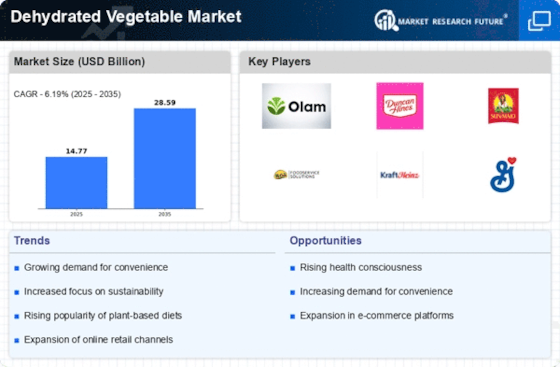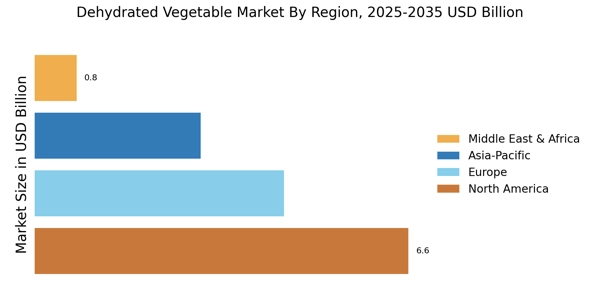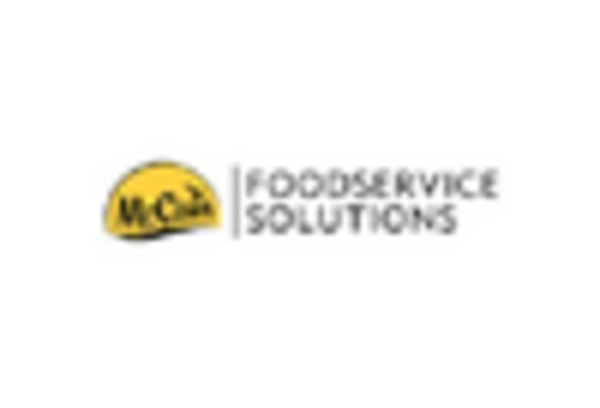E-commerce Growth
The rapid expansion of e-commerce platforms is significantly influencing the Dehydrated Vegetable Market. As online shopping becomes more prevalent, consumers are increasingly purchasing dehydrated vegetables through digital channels. This shift not only provides greater accessibility to a wider range of products but also allows for competitive pricing and convenience. Recent reports indicate that online grocery sales are projected to continue their upward trajectory, with dehydrated vegetables being a popular choice among health-conscious consumers. This trend suggests that businesses within the Dehydrated Vegetable Market that invest in e-commerce strategies may enhance their market reach and cater to the evolving shopping preferences of consumers.
Culinary Diversity
The growing interest in diverse cuisines and culinary experimentation is driving the Dehydrated Vegetable Market. As consumers become more adventurous in their cooking, the demand for a variety of dehydrated vegetables has increased. These products allow for easy incorporation of unique flavors and textures into meals, catering to a wide range of dietary preferences. Recent data indicates that the ethnic food market is expanding, with dehydrated vegetables serving as essential ingredients in many traditional dishes. This trend suggests that the Dehydrated Vegetable Market can leverage the rising popularity of international cuisines to broaden its product offerings and attract a diverse customer base.
Health Consciousness
The increasing awareness of health and nutrition among consumers appears to be a primary driver for the Dehydrated Vegetable Market. As individuals seek healthier food options, the demand for dehydrated vegetables, which retain essential nutrients, has surged. According to recent data, the market for dehydrated vegetables is projected to grow at a compound annual growth rate of approximately 6.5% over the next five years. This trend is particularly evident in regions where consumers are gravitating towards plant-based diets, as dehydrated vegetables offer a convenient and nutritious alternative. Furthermore, the rise of health-focused meal kits and snacks has further propelled the consumption of dehydrated vegetables, indicating a shift in dietary preferences that the Dehydrated Vegetable Market is poised to capitalize on.
Convenience and Shelf Life
The demand for convenience in food preparation is a significant driver for the Dehydrated Vegetable Market. As lifestyles become increasingly hectic, consumers are seeking quick and easy meal solutions. Dehydrated vegetables offer a long shelf life and require minimal preparation, making them an attractive option for busy households. Market analysis indicates that the convenience food sector is experiencing robust growth, with dehydrated vegetables playing a pivotal role. The ability to store these products without refrigeration and their versatility in various culinary applications further enhance their appeal. This trend suggests that the Dehydrated Vegetable Market is well-positioned to meet the needs of modern consumers who prioritize convenience without compromising on nutrition.
Sustainability Initiatives
Sustainability has emerged as a crucial factor influencing consumer choices, thereby impacting the Dehydrated Vegetable Market. As environmental concerns grow, consumers are increasingly favoring products that align with sustainable practices. Dehydrated vegetables, which often require less water and energy for production compared to fresh counterparts, are seen as a more eco-friendly option. Additionally, the reduction of food waste through dehydration processes resonates with environmentally conscious consumers. Recent statistics suggest that the market for sustainable food products is expanding, with dehydrated vegetables being a key component. This trend indicates that companies within the Dehydrated Vegetable Market that prioritize sustainability may gain a competitive edge, appealing to a demographic that values ethical consumption.


















